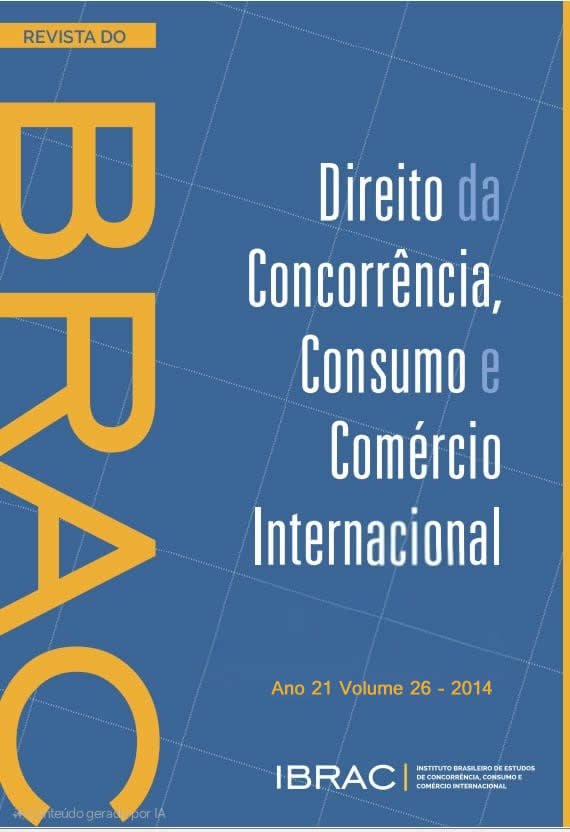A defesa da concorrência no mercado midiático e as ineficiências da concentração
Main Article Content
Abstract
This paper discusses how competition policy, once applied to the context of media economics, plays a key-role in fostering diversity
in the market of ideas. Through a criticai approach to the highly concentrated structures that allow the "media giants" to persist, the article analyses the media product under the public interest perspective, highlights the different efficiencies involved in this sector and evaluates the impacts of media concentration on consumer welfare and on the development of social choice. Acknowledging that antitrust policy is not in itself sufficient to promote media pluralism, it is noted, on the other hand, that economic concentration
in media outlets is contrary to democracy and this concern should be more present in the Brazilian Antitrust Agency interventions within the media market.
Downloads
Article Details

This work is licensed under a Creative Commons Attribution 4.0 International License.
References
Aqui estão as referências formatadas conforme solicitado:
ALBARRAN, Alan B. Media Economics. In: The Sage Handbook of Media Studies. EUA: Sage Publications, 2004.
ARIÑO, Mónica. Competition law and pluralism in European digital broadcasting: addressing the gaps. Communications & Strategies. n. 54. 2004.
BAKER, C. Edwin. An economic critique of free trade in media products. North Carolina Law Review. vol. 78. 2000.
BAKER, C. Edwin. Media concentration: giving up on democracy. Florida Law Review. vol. 54. n. 5. 2002.
BAKER, C. Edwin. The media that citizens need. University of Pennsylvania Law Review. vol. 147. n. 2. 1998.
BARENDT, Eric. Broadcasting law: a comparative study. Oxford: Clarendon Press, 1993.
CADE. Atos de Concentração n. 53500.002423/2003 e 53500.029160/2004. Voto do Conselheiro relator Carlos Delorme Prado, 24 maio 2006. Disponível em: [www.cade.gov.br/iemp/D_D000000229381716.pdf].
COLLINS, Richard; MURRONI, Cristina. New media, new policies: media and Communications strategy for the future. Cambridge/MA: Blackwell Publishers, 1996.
CUILEMBURG, Jan Van. On competition, access and diversity in media, old and new: some remarks for Communications policy in the Information age. New Media & Society. vol. 1. n. 2. Londres: Sage, 1999.
CURRAN, James et al. Media system, public knowledge and democracy: a comparative study. European Journal of Communication. vol. 24. p. 7. 2009. Disponível em: [http://ejc.sagepub.com/content/24/l/5].
DOYLE, Gillian. Understanding media economics. Londres: Sage, p. 11.
EUROPEAN COMMISSION GREEN PAPER. Pluralism and media concentration in the internai market: an assessment of the need for community action. dez. 1992. p. 19. Disponível em: [http://europa.eu/documents/comm/green_papers/pdf/com92_46_en.pdf].
FARACO, Alexandre Ditzel. Difusão do conhecimento e desenvolvimento: a regulação do setor de radiodifusão. In: SALOMÃO FILHO, Calixto (coord.). Regulação e desenvolvimento. São Paulo: Malheiros, 2002.
FEINTUCK, Mike. Media regulation, public interest and the law. Edinburgh: Edinburgh University Press, 1999.
FERNANDES, André de Godoy. Meios de comunicação social no Brasil: promoção do pluralismo, direito concorrencial e regulação. Tese de Doutorado, São Paulo, 2009. Disponível em: [www.teses.usp.br/teses/disponiveis/2/2132tde-02122009-152713/pt-br.ph1].
HALL, Stuart et al. Policing the crisis: mugging, the State and law and order. London: The Macmillan Press, 1978.
HAYEK, Friedrich A. Individualism and economic order. Chicago: University of Chicago Press, 1948.
ICN. Antitrust Enforcement in Regulated Sectors Working Group: Report to the Third ICN Annual Conference. Seoul, 2004, p. 2. Disponível em: [www.internationalcompetitionnetwork.org/uploads/library/doc377.pdf].
MARSDEN, Chris T. The European Digital Convergence Paradigm: From Structural Pluralism to Behavioural Competition. The Journal of Information, Law and Technology. n. 3. 1997. Disponível em: [www2.warwick.ac.uk/fac/soc/law/elj/jilt/1997_3/marsdenl/].
MCCHESNEY, Robert D. The problem of the media: US communication politics in the twenty-first century. New York: NYU Press, 2004.
MCQUAIL, Denis. Media performance: mass communication and the public interest. Amsterdam: Sage, 1992.
NAPOLI, Philip M. Audience economics: media institutions and the audience marketplace. Columbia University Press: New York, 2003.
OCDE. OECD Policy Roundtables: Competition Issues in Television and Broadcasting, Background Note. 2013. Disponível em: [www.oecd.org/daf/competiiion/TV-and-broadcasting2013.pdf].
PAMLIK, John V. Citizen Access, Involvement, and Freedom of Expression in an Electronic Environment. In: The people’s right to know: Media, democracy, and the Information highway. London: Routledge, 2013.
PEACOCK, Alan; RIZZO, Hilde (eds.). Cultural economics and cultural policies. Holanda: Kluwer Academic Publishers, 1994.
PICARD, Robert. Media economics: concepts and issues. EUA: Sage, 1989.
POLTRACK, David. Television marketing: network, local, and cable. New York: McGraw-Hill, 1983.
POSSAS, Mario Luiz et al. Política antitruste: um enfoque schumpeteriano. Rio de Janeiro: Instituto de Economia Industrial da UFRJ, 1995. p. 21-25. Disponível em: [lwww.ie.ufrj.br/grc/docs/politica_antitrusie_um_enfoque_schumpeteriano.doc].
PRICE, Monroe E. The market for loyalties: electronic media and the global competition for allegiances. Yale Law Journal, vol. 104. 1994-1995.
SALOMÃO FILHO, Calixto. Direito concorrencial. São Paulo: Malheiros, 2013.
SALOMÃO FILHO, Calixto. Regulação, desenvolvimento e meio ambiente. In: SALOMÃO FILHO, Calixto (coord.). Regulação e desenvolvimento - Novos temas. São Paulo: Malheiros, 2012.
SCHULTZ, Julianne. Reviving the fourth State: democracy, accountability and the media. Australia: Cambridge University Press, 1998.
STIGLITZ, Joseph E. The Price of Inequality. EUA: W.W. Norton & Company, 2013.
WHISH, Richard; BAILEY, David. Competition Law. 7. ed. Oxford: Oxford University Press, 2012.

